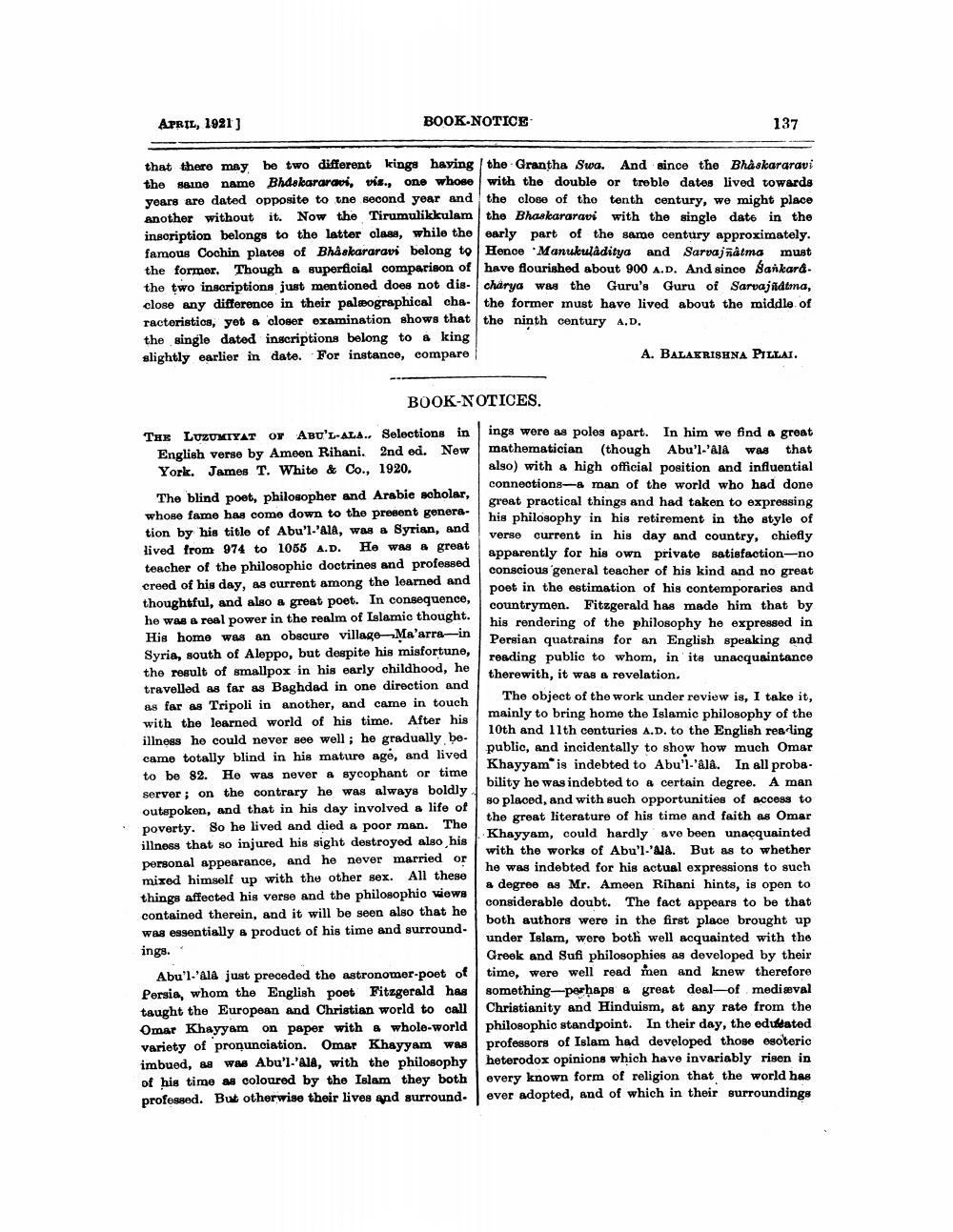________________
APRIL, 1921]
BOOK-NOTICE
the saine
that there may be two different kings having the Grantha Swa. And since the Bhaskararavi name Bhaskararavi, viz., one whose with the double or treble dates lived towards years are dated opposite to the second year and the close of the tenth century, we might place another without it. Now the Tirumulikkulam the Bhaskararavi with the single date in the inscription belongs to the latter class, while the early part of the same century approximately. famous Cochin plates of Bhaskararavi belong to Hence Manukulâditya and Sarvajñâtma must the former. Though a superficial comparison of have flourished about 900 A.D. And since Sankara. the two inscriptions just mentioned does not dis- charya was the Guru's Guru of Sarvajñatma, close any difference in their palæographical cha- the former must have lived about the middle of racteristics, yet a closer examination shows that the ninth century A.D. the single dated inscriptions belong to a king slightly earlier in date. For instance, compare
BOOK-NOTICES.
THE LUZUMIYAT OF ABU'L-ALA.. Selections in English verse by Ameen Rihani. 2nd ed. New York. James T. White & Co., 1920,
The blind poet, philosopher and Arabie scholar, whose fame has come down to the present generation by his title of Abu'l-'ala, was a Syrian, and lived from 974 to 1055 A.D. He was a great teacher of the philosophic doctrines and professed creed of his day, as current among the learned and thoughtful, and also a great poet. In consequence, he was a real power in the realm of Islamic thought. His home was an obscure village-Ma'arra-in Syria, south of Aleppo, but despite his misfortune, the result of smallpox in his early childhood, he travelled as far as Baghdad in one direction and as far as Tripoli in another, and came in touch with the learned world of his time. After his illness he could never see well; he gradually be. came totally blind in his mature age, and lived to be 82. He was never a sycophant or time server; on the contrary he was always boldly outspoken, and that in his day involved a life of poverty. So he lived and died a poor man. The illness that so injured his sight destroyed also his personal appearance, and he never married or mixed himself up with the other sex. All these things affected his verse and the philosophic views contained therein, and it will be seen also that he was essentially a product of his time and surroundings.
137
Abu'l-'Ala just preceded the astronomer-poet of Persia, whom the English poet Fitzgerald has taught the European and Christian world to call Omar Khayyam on paper with a whole-world variety of pronunciation. Omar Khayyam was imbued, as was Abu'l-'ala, with the philosophy of his time as coloured by the Islam they both professed. But otherwise their lives and surround.
A. BALAKRISHNA PILLAI.
ings were as poles apart. In him we find a great mathematician (though Abu'l-'ala was that also) with a high official position and influential connections-a man of the world who had done great practical things and had taken to expressing his philosophy in his retirement in the style of verse current in his day and country, chiefly apparently for his own private satisfaction-no conscious 'general teacher of his kind and no great poet in the estimation of his contemporaries and countrymen. Fitzgerald has made him that by his rendering of the philosophy he expressed in Persian quatrains for an English speaking and reading public to whom, in its unacquaintance therewith, it was a revelation.
The object of the work under review is, I take it, mainly to bring home the Islamic philosophy of the 10th and 11th centuries A.D. to the English rearling public, and incidentally to show how much Omar Khayyam is indebted to Abu'l-'âlâ. In all probability he was indebted to a certain degree. A man
so placed, and with such opportunities of access to the great literature of his time and faith as Omar Khayyam, could hardly ave been unacquainted
with the works of Abu'l-'ala. But as to whether he was indebted for his actual expressions to such a degree as Mr. Ameen Rihani hints, is open to considerable doubt. The fact appears to be that both authors were in the first place brought up under Islam, were both well acquainted with the Greek and Sufi philosophies as developed by their time, were well read men and knew therefore something-perhaps a great deal of medieval Christianity and Hinduism, at any rate from the philosophic standpoint. In their day, the educated professors of Islam had developed those esoteric heterodox opinions which have invariably risen in every known form of religion that the world has ever adopted, and of which in their surroundings




